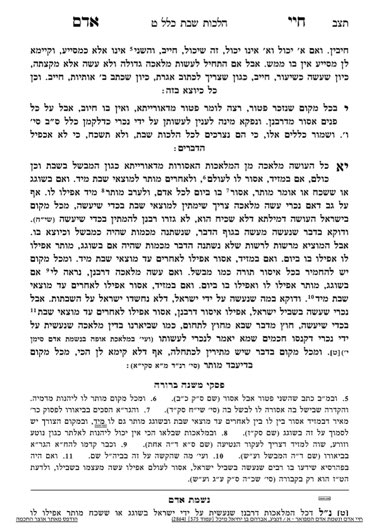Sponsorships for the upcoming Klalim, which discuss the 39 melachos of Shabbos, are available. Please contact Rabbi Reingold for more information at rabbireingold@gmail.com or 301.996.5910
We are continuing in siman 11, discussing the concept of maaseh Shabbos. We learned that if the benefit from the maaseh Shabbos is indirect, the issur of maaseh Shabbos does not apply. This point is not explicit in any Gemara, but discussed in the rishonim. The rishonim discuss deriving benefit from amira l’akum and write that benefiting from the action performed by the non-Jew is also assur on Shabbos. Tosfos differentiates between direct benefit and indirect benefit, and holds that one may benefit from the indirect benefit which is a result of amira l’akum. For example, if a non-Jew turns on a light from a Jew, the Jew cannot benefit from the light. If the light was on and the non-Jew turns off the light, although the Jew was not allowed to instruct the non-Jew to perform the melacha, the Jew may benefit from the fact the non-Jew turned off the light, because the benefit stems from that which the non-Jew removed.
Similarly, regarding maaseh Shabbos, the poskim suggest that indirect benefit will be permitted as well. Going back to the example of the Shul, where Reb Moshe writes that a non-Jew should unlock the doors, the machlokes between Reb Moshe and Reb Shlomo Zalman is whether we consider entering the building as direct benefit. The Jew carried the key through a reshus harabbim, which is an issur deoraysa, but the benefit is not from the key inasmuch as from the ability to get inside. Therefore, while Reb Shlomo Zalman considers the benefit to be indirect, and only using the key to open would be assur, Reb Moshe holds that the ability to enter the building is the entire purpose of the key, so one directly benefits from the key when the door is opened, and it is assur to receive direct benefit from the Jew’s maaseh Shabbos.
If a non-religious Jew drives somewhere and brings an item, such as a non-frum guest who brings a gift, one of the questions to consider is whether one can benefit from the melacha. The melacha was performed on the car, not on the food, so benefiting from the food is not a direct benefit. Therefore, some poskim are matir in that situation. Others are machmir because they consider it as part of the process of a person driving somewhere, so they consider it direct.
If a business produces items and/or delivers them on Shabbos, everyone agrees one may not benefit from them on Shabbos, for two reasons. First, the purpose of the delivery is the primary purpose of the business, so we consider it direct benefit. Second, benefitting from the item may be viewed as encouragement by the business to perform the aveirah. This second point has elements of lifnei iver and chilul Hashem, and therefore it would be inappropriate to benefit from it.
Summary
- In the same way one can benefit from indirect amira l’akum, one can benefit indirectly from maaseh Shabbos of a Jew. However, if the seemingly indirect benefit of the maaseh Shabbos is part of the main purpose/goal of the maaseh Shabbos, it may be considered direct benefit, and will be assur.



